Welcome to Week Eight of this 144th Assembly. A colleague of mine reminded me this past week that while, for some, this is nearing the end of our season together, for many Week Eight is actually Week One! For those joining us on these sacred grounds for the first time this season, you enter as we have just completed an incredible exploration of the role that “fear” plays in society and in our choices. Some might say it’s a perfect precursor to our week on “Media and the News: Ethics in the Digital Age.”
Why do I say that? I don’t mean to in any way indicate that we should fear the media, but I do intend to telegraph that we come to this week with an understanding that the debates around “fake news,” “what is the truth?” and the onslaught of 24/7 information has certainly colored the way that we process our ongoing discussion of what’s happening in the nation and the world.
The creative disruption of traditional media is bringing about a crisis in local journalism and changing the role of journalists in a changing America. In this age of information overload, who and what do we trust and how do we become smarter news consumers? How is data journalism bridging tradition and innovation to provide a deeper understanding of our world? Do emerging business models aimed at “saving” news organizations threaten journalistic independence? In the age of podcasting, where do we draw the line between information and entertainment? What are the challenges of a reporter becoming part of the story?
For an institution that loves questions as much as it loves answers, these are but a few of the many modes of inquiry we’ll pursue in this dynamic week.
As always, our companion Interfaith Lecture Series stresses the word “ethics” as much as any other in the title of this week’s theme. Consider this: The world community now experiences a 24/7 barrage of news and information that penetrates all aspects of the world’s culture — indeed, that not only shapes commerce, consumerism and world affairs, but also permeates the private sphere. What are the ethical obligations of information consumers? Of the community? What are the ethics of reporting and advocacy? How does the citizen discern truth and make ethical choices in the face of Big Data and big distortions? In this week, we will ask how to stay afloat in the flood of information overload, and we are lucky to have journalist Jim Fallows help us look at these thorny ethical issues. Jim’s wit and insight are likely to have the Hall of Philosophy packed, so consider this a gentle reminder to get there early if you want a good seat.
This week is also a special one for me, as my own academic training is in journalism, I spent some of my early years as a professional journalist, and, as many of you know, I got my Chautauqua start 20-plus years ago at our own Chautauquan Daily.
This exploration of media is deeply tied to our call to develop a muscular civil dialogue in the nation. I had the pleasure of spending some time with Chautauquan and Time magazine Managing Editor Nancy Gibbs earlier this week. Nancy and I had a rich conversation about the connection between receiving and deciphering news, and the ability of our citizens to truly engage in dialogue. The two are so intertwined. Nancy will share that and more Thursday on the lecture platform. Since coming to Chautauqua, I have felt fortunate to spend time with Nancy and feel blessed to call her a friend. It’s a joy to have her — along with all those helping us to dive into this week’s topic — at Chautauqua for this fascinating week.
Thank you to all the Chautauquans who came out or joined us online for our inaugural Chautauqua Muscular Civil Dialogue Initiative session with Claremont Lincoln University this past Friday. I hope the session is just the beginning of a broader journey for Chautauqua in helping us all find ways to enter into dialogue.
I started this past week having a chance to offer the traditional President’s Address to the Bestor Society. It was a beautiful summer day overlooking the lake, and I was filled with gratitude for those assembled who help us make Chautauqua’s mission come alive. I want to share an excerpt from that address with you here to close out this weekly greeting, as it goes to the heart of what I’ve been thinking about as we’ve wrestled with the idea of civil dialogue this season. That day I shared:
Bill Bates stopped me just yesterday in front of the post office to share a David Brooks column from The New York Times titled “Can People Change After Middle Age?” In it, Brooks argues that true social change can only come after personal transformation.
Brooks argues that people who have transformed themselves to make society better have learned to “speak in the middle voice.” He goes on to say, “Sometimes we speak in the passive voice, when things are happening to us. Sometimes we speak in the active voice, when we’re lecturing and taking charge. But mature activists speak in the middle voice, which is receiving and volleying, listening and responding, the voice of equal and intimate relationship.”
I’d like to believe that David Brooks, who has graced our community more than once, may have had Chautauqua in mind when he wrote those words.
From a journalist comes the call to find a “voice of equal and intimate relationship.” For those who have asked what the “end game” is with all this “civil dialogue stuff,” I can think of no better summary.
Welcome to another important week at Chautauqua. May this week more deeply bring us into an equal and more intimate relationship with the week’s topic and one another.



